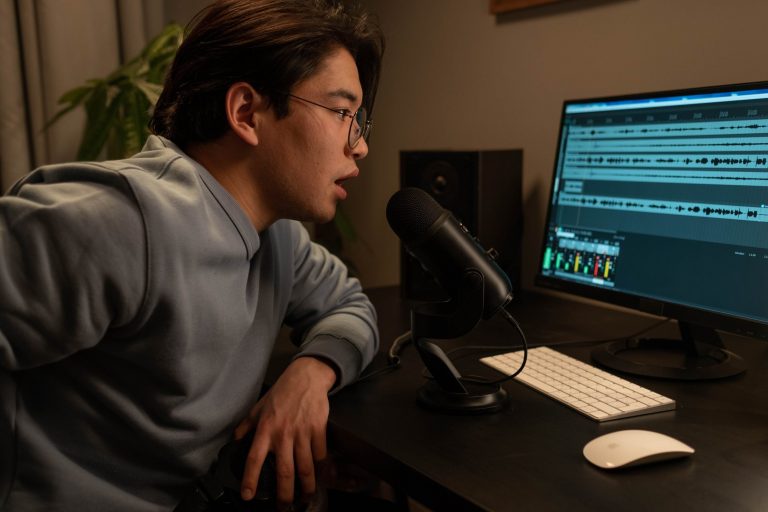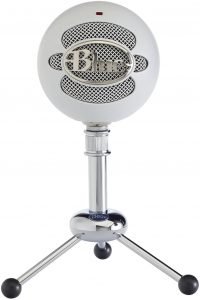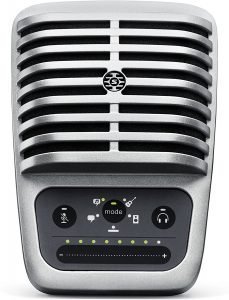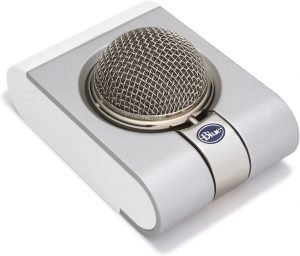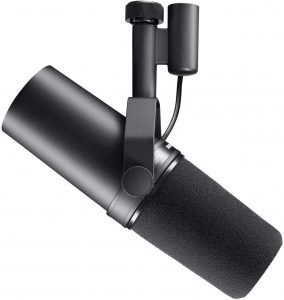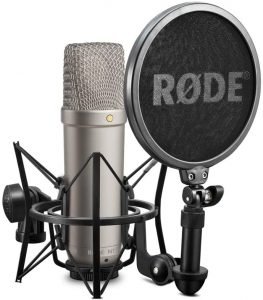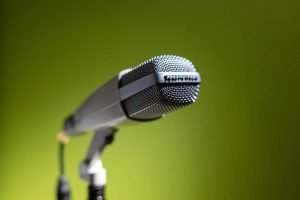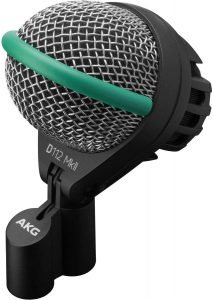Most home studio aficionados know that the most important pieces of equipment for getting the best sound out of any instrument are a good set of speakers and microphones.
However, it can be difficult to know which microphone is best for your needs — fortunately, we have done all the hard work for you in our comprehensive guide to selecting microphones.
We’ve broken down what type of microphone will be best suited to your needs and discussed some of our favorite products in each category.
A condenser microphone is a popular choice for recording vocals as they are highly directional, meaning they will pick up a very small area in the room and reject sounds from other sources.
They are also better than dynamic microphones at reproducing sound without adding artifacts such as phase distortion or electrical noise.
You will need to use an XLR cable to connect the mic to your audio interface or mixing desk.
This is a good choice for both live recording and podcasting due to its sturdy build quality and ease of use.
This mic also features a pop filter that protects your voice from unwanted plosives (also known as “pops”) artificially enhancing your sound when you are speaking in the microphone.
The microphone comes with an AC adapter, XLR cable, stand mount, shock mount, and carrying bag.
Table of Contents
8 Best Microphones For Home Studio Vocals
1. Blue Microphone Snowball
If you want to record in a studio then the Blue Microphone Snowball ($149.95) may be a great option for you. The mic boasts a strong frequency response, even in high sounds, and is very clear and accurate while recording vocals.
The microphone comes with a foam windscreen, stand mount, and windscreen. It is also quite affordable and works well for both close-up recordings as well as recording the sounds of people talking in rooms or studios that have an echo effect on certain frequencies.
2. Shure MV51
The Shure MV51 is a great choice for anyone looking for an affordable microphone that comes ready to be plugged in and used straight out of the box. The microphone works perfectly with either a PC or Mac, meaning you can use it with your favorite recording software right away.
One of the best features of this microphone is that it has a switch on the back to help you pick the most appropriate polar pattern. This is very useful if you’re working with other members of your team to ensure that each person has a polar pattern suited to their vocal range in mind.
The mic comes with an anti-pop filter, which not only protects your voice from unwanted plosives (also known as “pops”) artificially enhancing your sound when you are speaking in the microphone.
3. Blue Snowflake
The Blue Snowflake is a very affordable condenser microphone that is well suited to home studios using a portable vocal booth and other applications where quality sound recording is needed.
The microphone features a stereo pattern, meaning that it will pick up sounds from the left and the right channel even if you are standing in front of it.
This provides excellent room ambiance for your recordings, creating a more natural effect with no artificial enhancement of your voice or instrument sounds coming in through the mix.
4. Shure SM7B
The Shure SM7B ($339.95) is a very popular choice for podcasting and recording vocals and it has been used by the likes of Bono, Stevie Wonder, Sting, Barbra Streisand and many others over the years. The microphone features a cardioid pattern meaning that it will pick up sounds from in front of the mic only, rejecting sounds from other directions.
In addition, the mic has a switch on the back that lets you choose between diffuse-field or figure-8 mode, which is highly useful if you are recording other musicians in a band whether in your home studio or at a live performance.
The mic comes with a pop filter and shock mount to help protect the fragile electronics within the microphone from external noises and vibrations.
5. Rode NT1A
The Rode NT1A ($269.99) is a popular choice for home studios due to its precision and sonic detail as well as the fact that it’s so easy to use. The microphone features a cardioid pattern that cuts down on background noise and rejects sounds from other directions while enhancing the ones coming from your vocal mic.
It comes with a pop filter and a tripod stand. This is a good microphone for singers who want to add some acoustic music to the mix in their studio recordings, as the microphone doesn’t distort sounds from acoustic guitars, drums, or other instruments.
6. Sennheiser MD 421 II Cardioid Dynamic Mic
The Sennheiser MD 421 II is ideal for recording vocals thanks to its super-cardioid pick-up pattern (meaning it will focus on the sound coming in from the front of the mic while rejecting sounds from other directions). The microphone has a frequency response of 50 Hz to 18 kHz and comes with a built-in pop filter.
The microphone is also very well suited to live performances as it is resistant to feedback and it can handle high sound pressure levels.
7. Electro-Voice RE20
The Electro-Voice RE20 is perfect for recording anything acoustic or for vocals due to its omnidirectional frequency response (meaning it will pick up sounds from all directions). The mic has a frequency response from 20 Hz to 20 kHz and will cut down on background noise, making your voice sound brighter and more authentic.
The microphone also comes with an integrated pop filter which helps you keep the sound of your voice intact as you speak into the microphone.
8. AKG D112 MkII Professional Bass Drum Microphone
The AKG D112 MkII mic is best suited for drum players because of its cardioid nature. The mic focuses on the sound coming from in front of the mic while rejecting sound from other directions and is perfect for recording the full range of instruments including electric guitars, acoustics, and even vocals.
The AKG D112 MkII is a great microphone to pick up bass drums because it will pick up the sound of the kick drum while cutting down on the sound of the other instruments that are playing in its vicinity.
You’ll also have no problems recording vocals using this mic thanks to its super cardioid pattern. This means that it will focus on sounds from in front of the mic while rejecting sounds from other directions.
FAQs
How do I choose a microphone for my home recording studio?
Choosing a microphone for your home recording studio can be tricky if you don’t know what to look for. The best thing to do is try out different mics until you find one that sounds good and has the features you want. You’ll need to think about things like:
1 – What kind of sounds are on the vocals? (warm, bright, dark)
2 – How much room around the mic do I want or need?
3 -Do I need a pop filter?
4 – Am I going to use it on an electric guitar or bass? (You would use another type of microphone for this)
Is a condenser mic better for vocals?
Yes. Condenser mics are more sensitive to the proximity of sound sources and so can be more appropriate for close mics on vocals, but they also have a higher self-noise such that they are probably not better or worse overall for vocals than dynamic mics.
What microphones do professional singers use?
The mics that they use are usually condenser mics. The reason for this is because of how sensitive they are. Mostly professional singers use Shure SM58.
What is the best studio recording microphone?
The best overall studio recording microphone is the Shure MV7 USB, due to its performance at midrange frequencies and its low noise floor. Condenser mics are always better than dynamic mics for close-miking vocals due to their superior soundstaging properties.
They can also be louder without getting sibilance or distortion.
FAQ:
Q: What is the best microphone for home studio?
A: Rode NT1A Anniversary Vocal Condenser Microphone Package. The RØDE NT1-A condenser microphone has become an industry standard. … Shure SM7B Vocal Dynamic Microphone. The SM7B dynamic microphone has a smooth,flat,wide-range frequency response which is superb for vocals,music and speech. Sennheiser MD 421 II Cardioid Dynamic Mic. …
Q: What is the best vocal recording microphone?
A: There are many such microphone options, and they let you switch the pattern to be best for your current situation. If you don’t have any audio recording software yet … is also used frequently in music for vocals and instruments, the SM7B connects …
Q: What is the best budget mic?
A: TASCAM TM-80. It is first in our list of Best Budget Microphone For Vocals. … sE Electronics X1 S. The best microphone for recording vocals in the category of up to 10,000 rubles. … AKG D5. A direct competitor to the legendary Shure SM58 microphone. … Samson METEOR USB. … Samson C01U PRO USB. … Shure SM58. … Rode m3. … AKG P120. … Audio-Technica AT2020. … JZ Microphones HH1. …
Q: What are the best wireless microphone systems?
A: Sennheiser EW 100 – High End Mic. Sennheiser EW100 is arguably the most expensive wireless lavalier microphone available in the market. Rode RodeLink FM – Best Wireless Lavalier Mic for DSLR. … Comica CVM-WM300 – Best Lavalier Microphone 2024. … Shure BLX14/CVL – Best Lavalier Mic for Film. … Comica CVM-WM100 – Wireless Lavalier Mic For DSLRs. …
